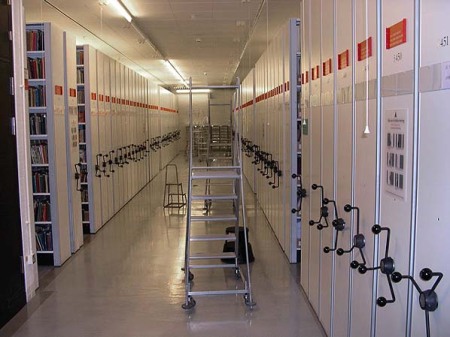Easter is the busiest time of the year at the British Library (so be warned if you are expecting a quiet space to do your research). In order to help cope with the volume of requests for books from our capacious basements in St Pancras, staff volunteers are requested.
 As a member of staff who rarely visits the basements this is an opportunity not to be missed. After all, the basements are the very foundation of the library, from both a physical and information perspective. The four double height basements containing the bulk of the library’s 15 million books stretch down to 75ft or 23m below ground level. The construction of these required digging the deepest hole ever seen in London. I could hear the nearby sounds of trains on the Northern and Victoria Lines when I was in basement 3.
As a member of staff who rarely visits the basements this is an opportunity not to be missed. After all, the basements are the very foundation of the library, from both a physical and information perspective. The four double height basements containing the bulk of the library’s 15 million books stretch down to 75ft or 23m below ground level. The construction of these required digging the deepest hole ever seen in London. I could hear the nearby sounds of trains on the Northern and Victoria Lines when I was in basement 3.
I spent a fascinating couple of hours re-shelving books in the humanities modern section. However, my trolley contained a random selection of topics giving a revealing glimpse into the subjects being researched above ground, as well as the incredible breadth of knowledge stored below ground.
 One fact that often surprises visitors to the basements is that the books are not stored according to any classification system. Although the British Library has adopted the Dewey system in the Reading Rooms, this would not work in the basements. The explanation is simple enough – the sheer volume of new books (6 miles or 13 kilometres) each year means that they have to be added onto the end of the previous set in acquisition order. Any other would require constant shifting of the book stock to make room.
One fact that often surprises visitors to the basements is that the books are not stored according to any classification system. Although the British Library has adopted the Dewey system in the Reading Rooms, this would not work in the basements. The explanation is simple enough – the sheer volume of new books (6 miles or 13 kilometres) each year means that they have to be added onto the end of the previous set in acquisition order. Any other would require constant shifting of the book stock to make room.
So, for instance if they were in alphabetical order by Title, the Z’s would slot nicely in at the end of the sequence but any new A’s would require moving the whole lot. This results in some vary odd pairings of books on the shelves. I re-shelved a book on Islamic terrorism literally cheek by jowl with a volume on right-wing Jewish politics.
The photos above come from a website Subterranea Britannica which has a detailed article on a visit to the basements.
 So much for the film or TV series of the book, how about the dramatised promotional video of the book that has yet to be printed.
So much for the film or TV series of the book, how about the dramatised promotional video of the book that has yet to be printed.







 Wikipedia is a registered charity which cost $1 million in 2007 and forecasted to cost $2-3 million in 2008 which is amazing considering it is now the 8th most popular website in the world. Even in Iran it is the 14 most popular.
Wikipedia is a registered charity which cost $1 million in 2007 and forecasted to cost $2-3 million in 2008 which is amazing considering it is now the 8th most popular website in the world. Even in Iran it is the 14 most popular.